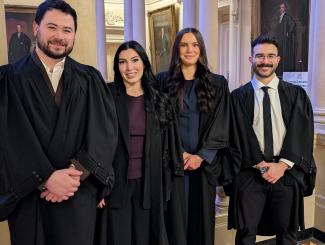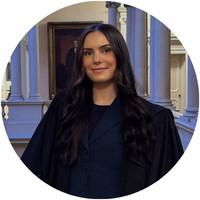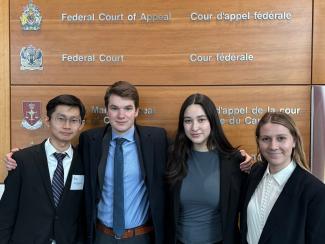Each year, second- and third-year Allard Law students spend countless hours researching, practising and preparing for upper-year moots.
Moots, which are simulated court proceedings, provide law students with an opportunity to gain invaluable coaching and feedback from experts in the legal profession and to practise thinking critically under pressure – all before beginning their careers as lawyers. We’re incredibly proud of all the hard work that our students put into their moots this year.
We spoke with three of our student mooters about what they’ve learned through their experiences: Siobhan Toal (Gale Moot Team), Liam Liu (Donald G.H. Bowman National Tax Moot) and Allison Spring (British Columbia Law Schools Competitive Moot).
Gale Cup Moot – Siobhan Toal

The national Gale Cup Moot, typically held in Toronto, attracts teams from across Canada. This moot focuses on topics in criminal law, often involving the Canadian Charter of Rights and Freedoms. Judges for the competition are drawn from courts across Canada, and final rounds are argued before at least one Supreme Court of Canada justice and other senior appellate level judges.

This year, the Allard Law team took home the Gale Cup. Allard Law student Siobhan Toal was a member of that team. “I’ve always been interested in litigation, but after arriving at law school, the notion of speaking in court was intimidating,” says Toal. “The Gale Moot was the perfect opportunity to push me out of my comfort zone and get feedback from some of the best coaches, lawyers and judges in the province.”
Your team won the Gale Cup! How did that feel? What was your strategy?
Coming into this moot, my teammates and I were close friends from the same small group in 1L. This familiarity was advantageous, as we could challenge each other to produce our best work and collaborate on crafting arguments. Our strategy was to play to our strengths: Tyleigh and I adopted a heavier research role, while Curtis volunteered his writing and editing skills, and Dylan led our team as an outstanding oral advocate.
It felt surreal sharing the win together. Our coaches also went above and beyond for us at every step of the competition. Professor Grant was available during all hours of the evening to look over our latest drafts, while Professor Benedet guided us through our weekly oral practices. Having coaches who held us to a high standard and believed that we would succeed made all the difference.
Is there a particular moment that stands out from your experience mooting this year?
After our first oral practice, I was informed that my mooting persona was very loud and intense, to the degree that some judges were hesitant to interrupt me with questions. Over the next nine practices, I struggled to find the sweet spot between being a zealous advocate and having a conversational tone with the bench.
However, moments before we left our sequestered quarters at the Ontario Court of Appeal, Professor Benedet gave me permission to go “full Siobhan” during the final round. I received a lot of invaluable feedback over the months that we practised, but I really appreciated being told to just be myself when it counted the most.
Donald G.H. Bowman National Tax Moot – Liam Liu

The Donald G.H. Bowman National Tax Moot is Canada’s first competitive moot on taxation and is administered by a committee of judges and practitioners. The Moot is named after the Honourable Donald G.H. Bowman, former Chief Justice of the Tax Court of Canada.

Students compete over two days in two preliminary rounds, semi-finals and the final moot before a panel of three judges.
Allard Law 2L student Liam Liu was on this year’s team. “The Bowman Tax Moot is a great intensive learning opportunity under the supervision of experts from Thorsteinssons,” says Liu. “I highly recommend our moot, no matter whether you want to do tax or any other law or pursue any options after law school.”
How did the experience of competing in an upper-year moot compare to your first-year moot?
I found 1L moot very helpful. The issues require less in-depth research, so students can focus on developing fundamental legal writing and advocacy skills.
For upper-year moots, the substance is more exciting. For example, our case problem examined current tax issues in a recent case. This allowed students to read case law line by line, appreciate nuanced reasoning and make principled critiques. Procedurally, a moot is a moot, but a moot like ours is the closest to the real court experience.
Most importantly, working as a team made me feel more confident and comfortable. You will have teammates and coaches to support each other throughout the whole process in respect of legal, logistical and even personal questions.
Is there a particular moment that stands out from your experience mooting this year?
Looking into the eyes of the judge and lawyers on the bench, I forgot my arguments after introducing myself in the first match. It was funny in a way, since I felt so confident before rising to the podium. I started talking slowly and wishing there were a restart button.
It was at this moment that one moot judge slightly nodded their head, smiling. And that smile helped me ground myself. The knowledge that you will always have the understanding and support from senior professionals and peers is all we need to get through a tough day.
British Columbia Law Schools Competitive Moot – Allison Spring
The British Columbia Law Schools Competitive Moot focuses on an appeal from a trial or appellate court decision on a tort law or property law issue. The competition is held each year in the courtrooms of the Superior Courts of British Columbia. This year, the Allard Law team brought home the winner’s trophy.

“For the BC Law Schools Moot, you’ll have the privilege of receiving feedback on your submissions from esteemed BC Supreme Court and Court of Appeal judges,” says team member Allison Spring, who won the prize for best factum. “You’ll also receive feedback in the weeks leading up to the moot from some of the top litigators in the province. It is truly a one-of-a-kind experience.”
You won this year’s prize for best factum. How did that feel? What was your strategy?
After many late nights of researching, drafting and editing, winning the prize for best factum was a very proud moment for me. At the same time, I felt incredibly grateful to my wonderful teammates and coaches for their detailed feedback and limitless support throughout the factum-writing process.
Prior to submitting my factum, I had the opportunity to present in front of Allard faculty and practising lawyers. This experience was essential to developing the substance of my arguments. Whenever the judges looked confused or unconvinced by my arguments, or the arguments of opposing counsel, I would adjust my factum accordingly. In terms of writing persuasively, my strategy was to be as direct and concise as possible. Plain communication is key.
Alumni often say that their upper-year moot was one of their best law school memories. Why do you think that is?
Participating in an upper-year moot has definitely been one of my best experiences at law school so far. Mooting allows you to problem-solve within a niche area of the law to a depth that is simply not possible in a traditional law school course.
You go through so much trial and error in determining how to research, craft and present your arguments effectively. It’s extremely rewarding when it all comes together.
Mooting also fosters deep connections within the team. Among your fellow student mooters, you brainstorm together, pick each other up, and perhaps even bring the trophy home together! It’s such a meaningful bonding experience.


